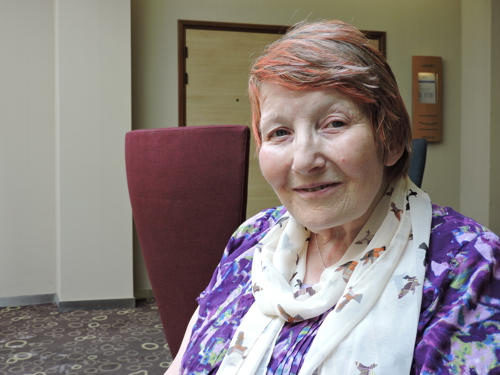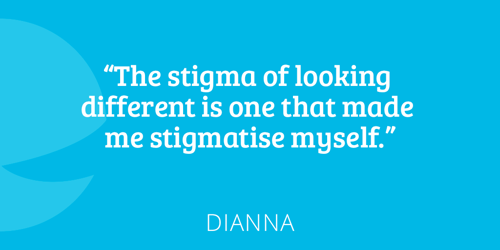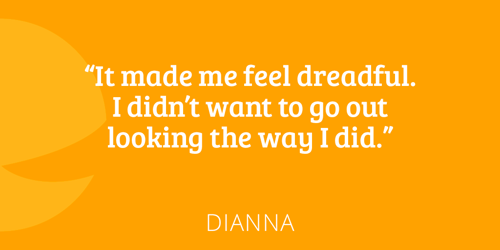Medication & Body Image: Dianna's Story for Mental Health Awareness Week
Posted by See Me, 13 May 2019
Next week is the start of Mental Health Awareness Week (13-19 May) and this year’s theme is body image. Body image issues can affect us all, and stigma around our bodies can negatively impact our mental health. But what happens when the side effects of medication for mental illness impact your body and how you look?
For Mental Health Awareness Week Dianna shares her story of how the side effects of medication impacted her life and her body image.

Whether I took medication or not made a tremendous difference to my life, and the way it impacted me. If I did take it I would get much bigger, I would tremble and slaver. I didn’t want to go out.
The stigma of looking different is one that made me stigmatise myself. But If I didn’t take my medication, I became quite unwell, quite quickly.
The medication was given to cut back on the psychotic symptoms that were part of the schizophrenia. A lot of us who had bipolar, or schizophrenia, or very sever depressive conditions that were related, could become quite out of touch with things. So we could be sectioned because we were incapacitated. So if we didn’t take the medication we were given, we became very unwell and were immediately sectioned. But we were not sectioned because we lacked capacity, we were sectioned purely because we weren’t taking the medication. This has changed now and you can only be sectioned because you’re incapacitated.
There is a major problem with not taking medication, because you do become extremely unwell.
But the reason you stop taking it is because it makes you dozy, not able to concentrate, it makes you slaver and tremble and worst of all you put on weight. You don’t have an appetite suppressant so you eat and eat. As you put on weight you lose motivation and don’t want to exercise. Those of us who have looked after our bodies and been careful with what we eat and make sure to exercise, can become different people all together on medication.

It made me feel dreadful, I didn’t want to go out looking the way I did, when I was young the acceptable body image was to be thin and able to look nice in the clothes that were the fashion.
When you’re overweight and have fluid retention you feel dreadful, you feel desperate. When your legs are swelling up you can’t get decent shoes on, or wear leggings or tights. So I used to hide with long dresses, or I wouldn’t go out at all because I felt so different from my peers. I was also reticent to go out and been seen because I was slavering and trembling.
The trembling was the desperate part, and that is a body image issue as well, because if you’re visibly shaking, it shows you up.
It is bad for young people and for older people.
We were told that you can either put on weight, and be healthy in your mental health, or you don’t take your medication and we will put you under section, and that was what we were told. Or you were told they could change you onto a different medication, but that could be worse. So you were absolutely petrified.
If you came off the medication the first thing that would change would be the trembling and the slavering, so when that stopped, you think, maybe the weight will come down? And if you were off it for a while and happened to be well and losing weight, then you connect the two and think, ‘it’s the medication that is putting the weight on, if I don’t take it, then it will be better’. But you weren’t, if you did stop taking your medication you did become noticeably unwell.
You look better because you don’t have noticeable side effects from the medication, but at the same time you then become distracted because of your illness, and possibly find yourself in conversation with someone who is not there. So the people around you are always asking if you’re taking your medication, and there is a constant threat you’ll get reported to your doctor. So it was a desperate situation.

There were times when I was better and not as demotivated. But a lot of the time it was not good. I was kept on long term medication, and there wasn’t the option to come off. When you were unwell, the medication was stepped up, unfortunately it didn’t come back down, so you ended up on terribly high doses.
When you’re young it’s awful to be the different person, and the one that people point at. When you’re paranoid anyway, having people noticeably chatting about you or laughing, that was dreadful, that was awful.
On one occasion, I was out on my own in a café. I was shaking because of the medication. Unknown to me someone at another table had phone the police, to say there was someone in the café who was taking drugs. They saw I was different, and was a young person and they reported it. That was awful, when you’re just trying to get on with your life. That ended up with me not wanting to go out.
I didn’t go out because I felt different, I was down about how I looked, but I also felt bad, because physically I couldn’t get a spring in my step, I was demotivated.
As I never wanted to go out, it impacted my marriage.
I kept in touch with my friends by writing and posting letters. I didn’t phone as I would wander in my speech and go off track, but I could keep very much within myself by writing, and that has always been my saviour. A lot of people I kept in touch with were people like myself, and we all responded to kindness.

I would say that people are not unkind. Everyone has some sort of issue with their body. One’s own body image is very personal, but no one is happy with what they have, so be more accepting of yourself. Be with someone you trust as well, who is kind, that really helps. If you’re with someone who is unwell, please remember to be supportive.
The pressure and worry was horrendous. When I became unwell the voices became vicious. But at that stage I didn’t think that popping a pill would help. We also weren’t told the side effects of our medication, so we didn’t know to start with what it was.
